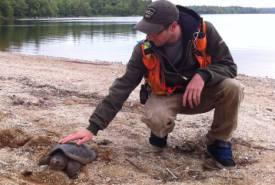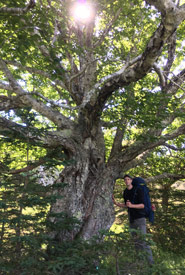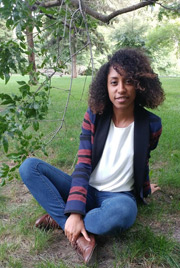Josh Noseworthy: Conservation is not about wildlife, it’s about people

Josh Noseworthy and a snapping turtle, Tusket River Headwaters Nature Reserve, NS (Photo by Frank Merill)
“Conservation isn’t about wildlife, it’s about people. If you’re serious about conserving wildlife, you need to understand how people work.” – Josh Noseworthy
Imagine walking through woods thick with ancient, old-growth trees. Woods speckled with mammoth-sized, awe-inspiring trunks that have existed for hundreds of years. Have you ever looked upon a forest full of ancient trees knowing you would be the last person to see them? Josh Noseworthy has. While working with a forestry company in California, Josh suddenly realized he’d be the last person to see these ancient forests before they were cut down. The sense of loss for what took centuries to develop no doubt provides the motivation that spurs his pursuit of a more effective approach to conservation.
“I’d be in this forest admiring the ancient trees, and, after a while, it dawned on me that I would be the last person to see these forests before they would be cut down. There’s nothing wrong with cutting trees, but there’s a right way to do it and many wrong ways to do it, and it’s important that society can distinguish between the two.”

Blog author Josh Noseworthy (Photo by Richelle Martin)
Josh’s pursuit of knowledge and his journey working in conservation is uniquely interesting. He started out as an intern almost 10 years ago at the Nature Conservancy of Canada (NCC) and he is now the director of conservation science in the Atlantic Region.
Having spent extended time in the forest — for both work and play — Josh has developed a great appreciation and respect for nature’s wonders. His dogged pursuit of knowledge grew partly from believing that the more you know, the greater the positive impact you can have on the planet. After obtaining a forest technician diploma at the Maritime College of Forest Technology, he went on to acquire both bachelor’s and master’s degrees in forest science from the University of New Brunswick. Years later, he then went on to pursue another master’s degree in conservation leadership at the University of Cambridge in the UK.
Upon leaving the master’s program, Josh came away with two main lessons:
1. Conservation isn’t about wildlife, it’s about people.
There has been a long-standing conflict among the conservation community, where some people believe successful conservation requires the exclusion of people, while others believe effective and long-term conservation must accommodate the needs of local people. Josh explained that both are essential in moving forward to create a healthy planet. Coming from a natural science background, he was used to framing things from a biocentric standpoint, meaning a viewpoint that considers all forms of life as having intrinsic value. He soon came to realize, however, that he needed a much broader perspective.
2. The dialogue about conservation has to derive from a positive, supportive foundation.
As he began to incorporate an understanding of the human psyche, the realization dawned on him that part of the reason that we, the conservation community, are not as successful as we should be in conservation is because we’re forcing negative — albeit very real — perceptions of the world on people who aren’t equipped to deal with them.
“They’re not as immersed in conservation, so they put up a barrier because they feel like they can’t make any real change. There needs to be a balance.”
Josh started a new social enterprise in 2017 called Global Conservation Solutions (GCS) that supports organizations in building capacity and developing innovative solutions to complex conservation issues. GCS aims to promote solutions and improve the impact of conservation. It also has a unique spin on social media, by focusing on positive conservation news stories from around the globe in an effort to engage more people in conservation.
“There are so many lessons that can be learned from conservation work all over the world. I hope that over time, GCS can serve as a knowledge-broker to show how we can scale up solutions that have been tried and tested.”
Changing the narrative that so often follows conservation and environmental news is important — probably now more than ever. We need to expand the conversation and focus more on the positive stories, especially because there is such a wealth of empowering success stories to draw from. Let’s have frank and positive discussions on the lessons learned and the steps we can take to improve the conditions of wildlife and wild spaces.
This planet is multi-faceted, dynamic and wondrous, ever changing, evolving and shifting, and we who have such a great impact also bear a great responsibility. Josh recognizes this and has put himself on the frontline to create positive meaningful change.
This post originally appeared on Micheline's personal blog, My Little Green Foot, and is reposted with permission.


